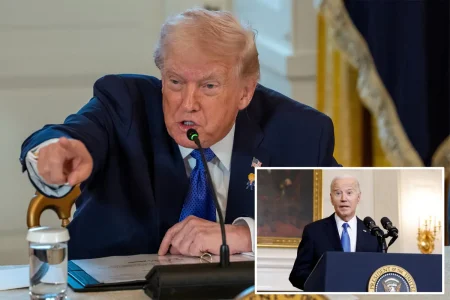Trump’s Saudi Connections: New Developments on the Horizon
In a significant revelation that highlights the ongoing intersection of business and politics, the chief executive of a prominent Saudi firm has recently expressed confidence that a Trump-branded project in Saudi Arabia is now “just a matter of time.” This statement comes alongside signals from the Trump Organization’s major foreign partner that new deals with Saudi Arabia are in development. These developments suggest a potential expansion of Trump business interests in the oil-rich kingdom, raising questions about the timing and implications of such ventures. The Saudi executive’s comment implies advanced discussions and possibly near-term announcements, though specific details about potential projects—whether hotels, golf courses, or other real estate developments—remain undisclosed to the public.
The Trump Organization’s history with Saudi Arabia has been marked by both business opportunities and political complexities. During Donald Trump’s presidency, his administration maintained close ties with Saudi leadership, particularly with Crown Prince Mohammed bin Salman, despite international controversies including the murder of journalist Jamal Khashoggi. Trump himself has previously acknowledged Saudi Arabia’s economic importance to his business empire, once stating that Saudis “buy apartments from me” and “spend $40 million, $50 million.” The current signals of new business developments come at a time when Trump remains a central figure in American politics, having secured the Republican nomination for the 2024 presidential race. This timing creates a complex backdrop for any new international business deals that might emerge.
The involvement of the Trump Organization’s major foreign partner in discussions about Saudi deals adds another layer of significance to these developments. This partner, whose identity and specific role have not been fully detailed in the available information, appears to be actively promoting or facilitating new business opportunities in Saudi Arabia. Their participation suggests a coordinated approach to expanding the Trump brand in the Middle East, potentially leveraging existing relationships and networks. The nature of these partnerships reflects the globalized character of the Trump business model, which has historically relied on licensing agreements and brand-value deals rather than direct ownership in many international ventures. How these business structures might be arranged for any new Saudi projects would have implications for both financial returns and potential conflicts of interest.
The Saudi context itself presents both opportunities and challenges for international business ventures. The kingdom has been implementing its ambitious “Vision 2030” economic diversification plan, which includes substantial investments in tourism, entertainment, and luxury developments—all sectors where Trump-branded properties might find a market. Saudi Arabia’s enormous sovereign wealth fund has been actively investing in international businesses and bringing global brands to the kingdom. However, the country also faces scrutiny over human rights issues, religious restrictions, and geopolitical tensions that can complicate international business relationships. Any Trump-branded development would need to navigate these complex socio-political realities while potentially benefiting from the kingdom’s substantial financial resources and development plans.
The timing of these discussions about Trump business expansion in Saudi Arabia inevitably raises questions about the interplay between commercial interests and political influence. Ethics experts and political opponents would likely scrutinize any announced deals for potential conflicts of interest, particularly given Trump’s continued prominence in American politics and his potential return to the White House. Previous administrations typically placed business holdings in blind trusts or otherwise distanced themselves from active business operations to avoid conflicts, but Trump’s approach during his presidency involved less separation between his business and political roles. How any new international business relationships might be structured in light of his ongoing political career remains a significant question, especially considering the strategic importance of U.S.-Saudi relations on issues ranging from oil prices to regional security and human rights.
Beyond the specific details of potential Trump-branded developments in Saudi Arabia, these discussions reflect broader patterns in global business and politics. They highlight the continuing global appeal of American luxury brands, the growing economic ambitions of Saudi Arabia as it seeks to diversify beyond oil, and the complex relationship between business networks and political power on the international stage. As details emerge about specific projects, locations, financing arrangements, and timelines, observers will gain greater insight into not just the commercial aspects of these ventures but also their potential implications for international relations, conflicts of interest, and the evolving relationship between American business interests and Saudi Arabia’s economic transformation. Whether these projects ultimately materialize, and under what conditions, will be closely watched by political analysts, business observers, and ethics experts alike.










